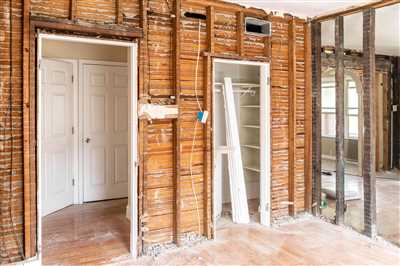
If you’ve been considering buying your own house, then you’ve probably had many thoughts and questions about the process. Purchasing a house is a significant financial commitment that needs careful consideration. Before you dive into the world of homeownership, it’s important to understand what it takes and what to expect. This guide will help you navigate through the steps involved in buying a house and provide valuable information to make informed decisions.
Firstly, one of the most important aspects of buying a house is the financial aspect. You need to consider how much money you will need for the deposit, closing costs, and ongoing monthly mortgage repayments. It’s essential to have a clear understanding of your financial situation and determine how much you can afford to borrow. Getting a pre-approval for a mortgage from a reliable lender will give you a better idea of the maximum loan amount you can borrow.
Another crucial factor to think about is the location of the house. You should consider where you want to buy a house, whether it’s in England, Scotland, Wales, or Northern Ireland. Each region has its own average house prices and levels of affordability. Factors such as proximity to work, schools, and amenities, as well as future potential for value appreciation, come into play when choosing a location. Take some time to research the different areas and make sure it aligns with your needs and preferences.
Furthermore, you need to understand the different types of mortgages available and choose the one that suits you best. There are various options, such as fixed-rate and adjustable-rate mortgages, and each has its own advantages and considerations. It’s essential to carefully review the terms, interest rates, and repayment plans before making a decision. A mortgage is a long-term financial commitment, so it’s crucial to choose the most suitable option for your circumstances.
Finally, when you’re ready to make an offer on a house, you will need to go through the complete process of purchasing. This includes making an offer, negotiating the terms, getting a survey, and engaging in further legal and financial procedures to finalize the deal. It’s worth noting that the process can take several months, so you need to be patient and prepared for any potential obstacles that may arise.
In conclusion, buying a house is a significant milestone in one’s life, and it requires careful planning and consideration. However, with the right guidance and information, you can navigate the process smoothly and successfully become a homeowner. This guide aims to help you in your journey towards owning your own house, providing valuable insights and practical tips to make the process easier and more manageable.
Buying a house on your own – a complete guide
Buying a house on your own can be a challenging but rewarding experience. It allows you the freedom to make decisions without relying on another person’s opinions. However, it also means taking on the full responsibility and financial burden of homeownership. Despite the challenges, owning your own home is still highly valued by many individuals.
If you’re a first-time buyer, it’s important to understand that buying a house on your own will require careful planning and budgeting. Before you start looking at properties, take the time to assess your financial situation and determine how much you can afford to spend. This will give you a clear idea of the price range you should be looking at.
The cost of buying a house can vary significantly depending on where you are located. For example, in London, house prices are typically much higher than in other parts of the country. In Northern Ireland, however, prices are relatively lower. It’s important to research the average house prices in the area where you want to buy.
Before you start the house hunting process, it’s crucial to get pre-approval for a mortgage. This will help you to determine the maximum amount you can borrow and the level of monthly repayments you can afford. It will also give you a better chance of securing a mortgage when you find a property you want to buy.
When considering a potential house, there are a few key factors to keep in mind. Think about the location and whether it suits your needs in terms of proximity to work, schools, and amenities. Also consider the size and condition of the property – is it big enough for your needs and in good enough condition that you won’t have to spend a lot on repairs?
Another important consideration is whether you want to buy a shared ownership property. This can be a more affordable option for some buyers, as it allows you to buy a percentage of the property and pay rent on the remaining share. However, it’s important to weigh the pros and cons before making a decision.
When it comes to financing your purchase, you’ll need to have enough money for a deposit. This is typically a percentage of the property’s value, and the exact amount will depend on the lender’s requirements. Additionally, you’ll need to cover other costs such as legal fees, survey costs, and moving expenses.
Before you buy, it’s important to consider the ongoing costs of homeownership. This includes mortgage repayments, utility bills, property taxes, and maintenance expenses. Take the time to estimate these costs and ensure that you have enough money to cover them on a monthly basis.
Buying a house on your own is a significant financial commitment, but with careful planning and thought, it can be a rewarding experience. Consider your own needs, finances, and the current market conditions when deciding if homeownership is the right choice for you. In 2023, the UK government has introduced a new mortgage guarantee scheme to help more people get onto the property ladder, so this could be a help if you’re struggling to find a large deposit.
How much money do you need to buy a house
When it comes to buying a house, one of the most important factors to consider is how much money you will need. The amount will vary depending on various factors such as the location, the size of the house, and the type of mortgage you choose.
First, you will need to cover the deposit. In England, the average deposit is around 10% of the property value, but it could be higher or lower depending on the lender’s requirements. In Scotland, the average deposit is around 15%. In Wales, it is around 5% for properties up to £250,000 and 10% for properties between £250,000 and £400,000.
In addition to the deposit, there are other costs involved in the process, such as solicitor fees, survey fees, and mortgage arrangement fees. These costs can vary, but you should estimate around 1-3% of the property value to cover these expenses.
If you’re buying in London or other expensive areas, you will likely need more money as house prices are higher in these locations. In the North of England or in Scotland, for example, you could potentially buy a bigger house for less money.
It’s also important to consider the monthly mortgage repayments. This will depend on the interest rate, the length of the mortgage, and the amount you borrow. You can use an online mortgage calculator to get an estimate of how much your monthly repayments could be.
In some cases, it might be better to rent rather than buy. If you’re a first-time buyer or if you don’t have enough money for a deposit, renting could be a more affordable option.
If you’re in England, you can also consider the Help to Buy scheme, which can assist first-time buyers with a deposit and provide an equity loan. In Wales, there is the Help to Buy – Wales scheme, and in Scotland, there is the Help to Buy (Scotland) Affordable New Build Scheme.
In summary, the amount of money you will need to buy a house will depend on various factors such as location, property value, and the type of mortgage you choose. It’s important to do your research, get pre-approval for a mortgage, and consider all the costs involved to ensure a smooth and successful home buying process.
How much deposit do you need to buy a house

When it comes to buying a house, one of the most important factors to consider is the deposit. The amount of money you need to save for a deposit will depend on a variety of factors, including where you’re buying the house, how much the house costs, and whether you’re a first-time buyer or not.
In the UK, the average deposit needed to buy a house is around 10% of the purchase price. However, this can vary depending on the area you’re looking to buy in. In London, for example, where house prices are generally higher, it’s not uncommon to have to put down a larger deposit of around 15% or more.
Before you start the process of buying a house, it’s important to have a clear idea of how much deposit you’ll need. This will help you set a goal and work towards saving that amount. It’s also a good idea to get a pre-approval from a mortgage lender, as this will give you a better understanding of how much money you could borrow and what your repayments would be.
While saving for a deposit is important, it’s also important to factor in other costs associated with buying a house. These can include legal fees, mortgage arrangement fees, and stamp duty. It’s a good idea to work out a budget and estimate how much these costs will be, so you can ensure you have enough money to cover everything.
In some cases, you may also be eligible for help with your deposit. For example, there are government schemes in place to help first-time buyers get on the property ladder, such as Help to Buy and Shared Ownership. These schemes can help you buy a house with a smaller deposit, making it more affordable for you.
It’s also worth noting that if you’re buying a house in Wales, the process is slightly different. The average house prices in Wales are generally lower than in England, so you may need a smaller deposit to buy a house there.
Overall, the amount of deposit you need to buy a house will depend on a variety of factors. It’s important to do your research and consider your own personal circumstances before making a decision. Remember, buying a house is a big financial commitment, so it’s important to make sure you’re in a stable financial position before taking the leap.
| Location | Minimum Deposit |
|---|---|
| England | 10% (average) |
| London | 15% or more |
| Wales | Lower than average |
Sources: which.co.uk, bankrate.com, moneyadviceservice.org.uk
Is it better to rent or buy?
When it comes to getting your own house, many people consider whether it is better to rent or buy. This decision depends on various factors such as time, mortgages, prices, and financial stability.
In 2023, house prices across the UK are still high. In some areas, like London and the South East, the prices are even more expensive. However, there’s a chance that house prices might decrease or increase in the future, so it’s essential to consider long-term value.
If you choose to rent, you will need to pay a deposit and monthly rent, which you won’t get back. On the other hand, buying a house requires a significant amount of money upfront, including a down payment and closing costs. Moreover, you will need to consider the interest on the mortgage and the additional expenses that come with homeownership.
It’s also important to note that buying a house involves going through a complex and lengthy process. This process includes finding the right house, getting pre-approval for a mortgage, making an offer, and completing the purchase. On the other hand, renting is usually a simpler and quicker process.
In some cases, renting may be a better option, especially if you’re unsure about your long-term plans or if you don’t have enough savings for a down payment. Renting also provides flexibility, as you can easily move to a different location without the hassle of selling a house.
However, buying a house can provide stability and the opportunity to build equity over time. It allows you to make the house your own and potentially increase its value through home improvements. Additionally, if you choose a fixed-rate mortgage, your monthly payments will remain the same throughout the loan term.
Ultimately, whether you decide to rent or buy depends on your personal circumstances, financial situation, and preferences. It’s essential to carefully consider both options, weigh the pros and cons, and seek advice from financial experts before making a decision.
Closing thoughts Buying a house in 2023

If you’re considering buying a house in 2023, there are a few things you should keep in mind. The first step is to determine how much you can afford to spend on a house. This will depend on your financial situation and the amount of savings you have for a deposit. It’s important to note that house prices can vary across the country, with London typically being more expensive than northern England or Wales.
Once you have an estimate of the value of the house you can afford, you’ll need to consider the mortgage options available to you. It’s always a good idea to work with a mortgage adviser who can guide you through the process and help you find the best mortgage for your needs. Mortgages usually require a deposit of at least 5% of the house’s value, so make sure you have enough savings to cover this.
Before you start house hunting, it’s a good idea to get a pre-approval for a mortgage. This will give you an idea of how much you can borrow and will make the process of buying a house much smoother. It’s also important to consider your monthly repayments and whether you can afford them in addition to other expenses you may have.
When it comes to buying a house, there are a lot of questions to consider. For example, do you want to buy a house on your own or with a partner? Do you want to buy a new build or an older property? Do you want to buy in a shared ownership scheme? These are all important factors to think about before making a purchase.
It’s worth noting that renting may be a better option for some people. Renting gives you more flexibility and may be more affordable in some cases, especially if you’re not sure where you want to settle down or if you’re not financially ready for homeownership yet. However, if you’ve thought it through and are ready to take the plunge, buying a house can be a great investment.
In conclusion, buying a house in 2023 is likely to be an expensive process, especially in areas like London where house prices are higher. However, with the right financial planning and the help of mortgage advisers, it is possible to find a house that suits your needs and budget. Take the time to research your options, consider your financial situation, and make sure you’re ready for the responsibilities of homeownership. Good luck with your house hunting!
How much can a single person borrow for a mortgage
When it comes to getting your own house, one of the most important questions is how much you can borrow for a mortgage. This guide will help you estimate the amount you could potentially borrow as a single person.
The amount you can borrow will depend on a few factors, such as your income, credit history, and the value of the property you are looking to buy. It’s also important to note that different regions have different borrowing limits. For example, in England, you can borrow up to 4.5 times your annual income, while in Scotland, you can borrow up to 4.25 times your income. In Wales and Northern Ireland, the limits are similar to those in England.
Before you can borrow, you will typically need to make a deposit. The size of the deposit will depend on the value of the property and the type of mortgage you are applying for. A larger deposit usually means you can access better interest rates and have lower monthly repayments.
It’s worth noting that this guide provides a general overview, and individual circumstances may differ. It’s always a good idea to seek advice from a mortgage advisor who can provide more accurate information based on your specific situation.
Another important aspect to consider is whether you will be able to comfortably afford the mortgage repayments. Lenders typically assess this by looking at your income and outgoings, including any existing debts or financial commitments. They will also take into account the future interest rate rises, ensuring that you can still afford the mortgage if rates were to increase.
The process of getting a mortgage can be complex, but there are steps you can take to improve your chances. For example, it’s important to keep your credit score in good shape by paying bills on time and not taking on too much additional debt. Lenders will also want to see a stable income and a demonstrated ability to save money.
If you are a first-time buyer, there may be some additional help available to you. The government has several schemes in place to assist first-time buyers, such as Help to Buy and Shared Ownership. These schemes aim to make it easier for people to get onto the property ladder by offering financial assistance or shared ownership options.
In summary, how much a single person can borrow for a mortgage will depend on various factors such as income, credit history, the value of the property, and the region you are buying in. It’s important to complete a thorough assessment of your financial situation and seek professional advice to get an accurate estimate.
Still have questions
- What is the average amount of money a person usually needs to borrow to buy a house?
- Is it better to rent or buy a house in England?
- How much deposit do I need to buy a house in London?
- What are the closing costs when buying a house?
- What is a pre-approval and why is it important?
- What are the monthly mortgage repayments like?
- What are the steps to buying a house?
- What are the chances of getting a mortgage?
- Do I need a financial adviser to buy a house?
- What is the process for getting a shared ownership house?
- Is it easier to buy a house in Scotland or Northern Ireland?
- What do I need to consider before buying a house?
- How long does it take to buy a house?
- What are the costs involved in buying a house?
- What are the interest rates for mortgages?
- What is the average house price in the UK?
- Should I buy a house now or wait until 2023?
- Is it cheaper to buy or rent a house?
- How can I get help to buy a house if I don’t have enough money?
- What happens if I can’t cover the mortgage repayments?
- What is the value of shared ownership?
- How does the Help to Buy scheme work?
If you still have any thoughts or questions about buying your own house, don’t hesitate to seek further guidance and information. Buying a house is a significant financial decision, and it’s important to be well-informed and prepared before taking the leap into homeownership.
Sources
When you’re looking to buy your own house, there are several sources you can consider to help you with the process.
1. Open a savings account: Before you can start the house hunting process, it’s important to estimate how much money you can afford to spend. By opening a savings account, you can start saving up for a down payment and closing costs.
2. Mortgage pre-approval: If you’re a person who doesn’t have enough savings to cover the entire purchase amount, getting a mortgage pre-approval can help. This will give you an idea of what loan amount you’re likely to be approved for and what your monthly repayments might look like.
3. Average costs in your area: It’s important to consider the average cost of houses in your area. In England and Wales, for example, the average house price is usually higher than in Scotland or Northern Ireland. Knowing the average prices can help you better estimate if you have enough money for a purchase.
4. Shared ownership: If you’re struggling to buy a house on your own, another option to consider is shared ownership. This allows you to buy a share of the property and then pay rent on the remaining share. It can be a more affordable way to get on the property ladder.
5. Government schemes: In some cases, the government offers assistance to first-time buyers to help them get their own house. These schemes can provide help with a deposit, offer discounted purchase prices, or provide loans.
6. Financial guide: If you have questions about the homebuying process or need more detailed information on mortgages and ownership costs, seeking advice from a financial guide can be beneficial. They can help you understand the process and navigate through the various financial aspects involved.
Remember, buying a house is a significant financial decision, so it’s important to consider all the sources available to you. Doing thorough research and seeking expert advice can help make the process smoother and ensure you’re making the best financial decisions for your own house.









